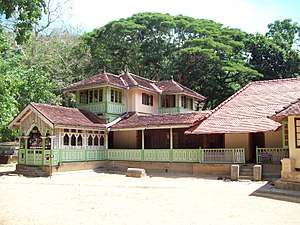Maduwanwela Walawwa
| Maduwanwela Walawwa | |
|---|---|
| මඩුවන්වෙල වලව්ව | |
 | |
| Alternative names | Maduwanwela Mansion |
| General information | |
| Type | Walawwa |
| Location | Maduwanwela |
| Town or city | Kolonna |
| Country | Sri Lanka |
| Coordinates | 06°23′21.0″N 80°42′12.5″E / 6.389167°N 80.703472°ECoordinates: 06°23′21.0″N 80°42′12.5″E / 6.389167°N 80.703472°E |
| Completed | 1725 |
| Owner | Department of Archaeology (Sri Lanka) |
| Designations | Archaeological protected monument (20 September 1974)[1] |
Maduwanwela Walawwa is a Walauwa located in upper South of Sri Lanka. Situated in the town of Kolonne, which lies between Embilipitiya and Suriyakanda in Ratnapura District, a distance of 207 km (129 mi) from the Colombo.
History
Maduwanwela Walawwa dates back to the reign of King Wimaladharmasuriya II (1687-1707 AD).[2] It was built by Maduwanwela Maha Mohottala in the 1700s and was expanded numerous times by the Maduwanwela family until 1905 when the final expansion was undertaken by Maduwanwela Maha Disawe.
The building
During 1877-1905 period, the Walawwa had 121 rooms, 21 inner courtyards (Meda Midula)[2] and 80 000 acres of land surrounding it, at present there are on 43 rooms left.[3] Located on in the grounds is a courthouse with seating space for 100 people, furniture and the equipment used for punishments are still present. Following the death of Maduwanwela Maha Disawe, the last of the Maduwanwela family, the house was transferred to Sir Francis Molamure. In 1974, it was transferred to the state and taken over by the Department of Archaeological and converted into a museum.[4]
References
- ↑ "Gazette". The Gazette of the Democratic Socialist Republic of Sri Lanka. 130. 20 September 1974.
- 1 2 Mahil Wijesinghe (9 April 2017). "Maduwanwela Walawwa: Home of rebellious black prince". Sunday Observer (Sri Lanka). Retrieved 14 April 2017.
- ↑ Dilrukshi Handunnetti (4 May 2013). "Maduwanwela Walauwa, the first walauwa to be conserved". The Sunday Leader. Retrieved 14 April 2017.
- ↑ Chamitha Kuruppu (15 August 2001). "A Prince's Paradise". The Daily Mirror (Sri Lanka). Retrieved 14 April 2017.